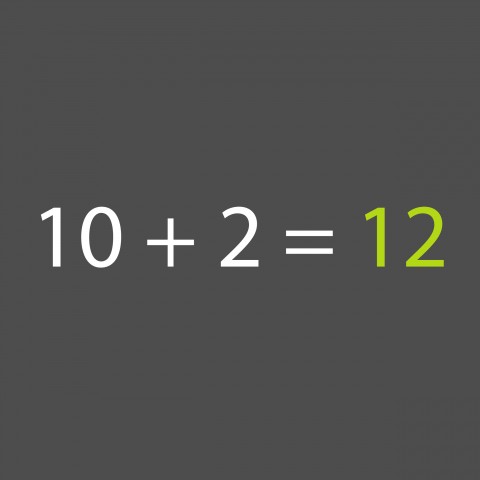It’s the language of Einstein, of Euler, of some of the most brilliant minds in history.
And with the reputation German has of being a difficult language, you’d think that the numbering system would be formidable.
Not so! It’s really just as approachable as most other languages—more complex than a few, but not nearly as complicated as others. And numbers in German language-learning really are too essential to skip over.
Since you’re able to read this article in English, you’ve got a great advantage already. It’s easy to map German numbers onto English ones, which you’ll soon find out with our handy German number guide here on GermanPod101.com! With our German numbers lists and useful information on how to use them, your numbers in German vocabulary will be strong indeed.
Table of Contents
- Cardinal Numbers
- Writing Numbers Down
- Special Numbers with Special Sounds
- Ordinal Numbers
- Once, Twice, Thrice
- Fractions and More (Easy) Math
- Lemme Get Your Number
- German Numbers and Dates
- Checking the Time
- Numbers When Shopping
- Conclusion: How GermanPod101 Can Help You Master German!
1. Cardinal Numbers
All right, let’s get right to it. Here are the numbers from zero to twelve in German (you can also look at our Numbers vocabulary list to hear each of the German numbers written down here pronounced). Note that, for the most part, the German numbers 1-20 are pretty regular.
| Number | German | English |
|---|---|---|
| 0 | Null | Zero |
| 1 | Eins | One |
| 2 | Zwei | Two |
| 3 | Drei | Three |
| 4 | Vier | Four |
| 5 | Fünf | Five |
| 6 | Sechs | Six |
| 7 | Sieben | Seven |
| 8 | Acht | Eight |
| 9 | Neun | Nine |
| 10 | Zehn | Ten |
| 11 | Elf | Eleven |
| 12 | Zwölf | Twelve |
A note about German numbers pronunciation: These numbers already sound awfully close to English. More so when you realize that words starting with “t” in English very often have a counterpart starting with “z” in German—remember the German “z” is pronounced [ts].
While we’re on the topic of pronunciation, let’s recall that an “s” at the beginning of a word is pronounced like “z” in English.
I’ll also mention that we went all the way up to twelve because eleven and twelve are “irregular” in both English and German. What do I mean by that?
Well, look at thirteen through nineteen:
| Number | German | English |
|---|---|---|
| 13 | Dreizehn | Thirteen |
| 14 | Vierzehn | Fourteen |
| 15 | Fünfzehn | Fifteen |
| 16 | Sechzehn | Sixteen |
| 17 | Siebzehn | Seventeen |
| 18 | Achtzehn | Eighteen |
| 19 | Neunzehn | Nineteen |
When talking about the “ten” numbers in English, we use the word “teen” at the end. But in German, it’s clear as day. Couldn’t be simpler. Eight and ten make eighteen. Germans make this easy by using the number and tacking the word for “ten” (zehn) to the end. See, numbers in German language really aren’t that hard!
Once we hit twenty (which is zwanzig) and beyond, that simplicity keeps going—but in a way that may make you do a double-take at first.
| Number | German | English |
|---|---|---|
| 21 | Einundzwanzig | Twenty-one |
| 22 | Zweiundzwanzig | Twenty-two |
| 23 | Dreiundzwanzig | Twenty-three |
Yes, it’s backwards from what we’re used to. Remember that old rhyme “four-and-twenty blackbirds baked in a pie?” Imagine we talked like that all the time, and you’ve got modern German.
But if you think about it, it really is just keeping the same pattern from thirteen through nineteen. “Eight-ten, nine-ten, twenty, one-and-twenty, two-and-twenty…”
The same pattern continues as long as you’ve got anything in the tens and ones place.
- Fünftausendzweihundert
Five-thousand two-hundred - Zweiunddreißigtausendsechshundertfünfundfünfzig
Thirty-two thousand six-hundred fifty-five.
Yeah, they’re all one word, up to the millions at least.
- Drei Million vierhunderttausend
Three-million four-hundred-thousand
Watch out here: in German, the really big numbers are false friends.
- Die Million, die Milliarde, die Billion
The million, the billion, the trillion
2. Writing Numbers Down
In Europe—not just Germany—most people write numbers with commas and decimals flipped from the way we use them in many English-speaking countries.
To separate hundreds, Germans use spaces or periods instead of commas.
- 35 000/35.000
35,000
And it’s even called das Komma!
- 3,3 Million (drei Komma drei Millionen)
3.3 million (three point three million)
Lastly, prices are expressed this way too, though we’ll go into that a little bit later.
- €13,45
€13.45
3. Special Numbers with Special Sounds
You know how airplane pilots in English always say stuff like “That’s Victor-seven-four-niner, over?” They say “niner” so that nobody confuses “nine” with “five.”
People reading out numbers in German will often say “zwo” for the same reason—nobody wants to confuse zwei and drei when the stakes are high!
In English, we have the special numbers “score” and “dozen,” meaning 20 and 12 units of something, respectively. “Score” was brought to England by the Vikings, but “dozen” is old enough to be in both German and English. You’ll find it in your German dictionary under Das Dutzend.
4. Ordinal Numbers
If you’ve had to learn English as a foreign language, you’ll be thrilled to hear that German ordinal numbers are much simpler than those in English.
Well, sort of. Here’s how they look in their nominative forms:
| Numeral | German | English |
|---|---|---|
| 1st | Erste | First |
| 2nd | Zweite | Second |
| 3rd | Dritte | Third |
| 4th | Vierte | Fourth |
| 5th | Fünfte | Fifth |
| 6th | Sechste | Sixth |
That’s right, they all end in –te!
So what’s the bad news? Well, they all have to follow the rules of German adjectives.
On the one hand, you’re just learning a bunch more adjectives and they’re all regular and predictable. Nothing too serious there.
On the other hand, you do have to stop and think about the cases when you use these words—at least until it all becomes automatic.
When writing these down, Germans follow other European conventions and simply put a full stop after the number to indicate that it’s an ordinal. There’s no written hint to tell you about the declension, unfortunately.
- 4. Stock (vierter Stock)
Fourth floor - zum 3. Mal (zum dritten Mal)
For the third time - am 12. Mai (am zwölften Mai)
On the twelfth of May
5. Once, Twice, Thrice
The word “time,” as in “there’s a first time for everything,” is mal in German. So the words for “once,” “twice,” “thrice,” and so on are simply einmal, zweimal, and dreimal. And where English stops at two or three (depending on if you like the word “thrice” or not), German continues ad infinitum.
- Man lebt nur einmal.
You only live once.
The word mal in German also carries the same meaning as “times” when talking about how many times larger, smaller, and so on that two things can be in comparison to each other.
- Fünfmal so breit.
Five times as wide.
One thing surprisingly absent from all of my German classes in school is how Germans order things at counter-service bakeries or restaurants. In our numbers in German lessons, we’ll try to cover this so you’re not left dazed and confused when ordering!
- Einmal Brezel, bitte.
One pretzel, please.
You’ll hear this used in every German city you go to, so you can likely use it wherever you go. If you go to order some food and it turns out that you’re not understood, simply go with ich hätte gern ein…bitte (meaning “I would like a…” in English) instead.
6. Fractions and More (Easy) Math
Are you out of school? You might have thought you wouldn’t need any math in your foreign language, but as it happens, basic math words are an important part of being able to use German effectively and precisely.
And it’s something that people tend to use in speech without thinking, maybe saying under their breath something like “let me see, that’s…thirty-five divided by seven…five dollars each!” If those numbers relate to you, you’re going to want to understand what’s going on.
There are three different words for “equals”: ergibt, ist, and macht.
- Fünf plus zehn macht fünfzehn.
Five plus ten equals fifteen. - Zwanzig minus dreizehn ist sieben.
Twenty minus thirteen equals seven. - Neunundneunzig durch neun ergibt elf.
Ninety-nine divided by nine equals eleven. - Zwölf mal zwölf macht einhundertvierundvierzig.
Twelve times twelve equals one-hundred forty-four.
As in English, a word for “times; by; multiplied by” is also used for noting dimensions of physical objects.
- Das Zimmer ist sechs Meter mal sieben Meter.
The room is six meters by seven meters.
Now, let’s take a look at fractions and percents. As in English, there are specific nouns meaning “an Xth part of,” and in German they’re just as regular. Check this out:
| German | English |
|---|---|
| Die Hälfte | The half |
| Das Drittel | The third |
| Das Viertel | The fourth |
| Das Fünftel | The fifth |
| Das Sechstel | The sixth |
| Das Zehntel | The tenth |
- Er hat ein Viertel einer Flasche Whiskey getrunken.
He drank a fourth of a bottle of whiskey.
Percentages in German work exactly the same as in English, with one word that’s practically the same in both languages.
- Ich verstehe vielleicht neunzig Prozent.
I understand about ninety percent.
7. Lemme Get Your Number
In English, when we tell someone our phone number, we usually break it up into sections. This varies, of course, depending on where you’re from. For example, American telephone numbers have a three-digit area code, and the number itself is broken up into two groups of three and four numbers. Or in Morocco, phone numbers are broken up into five groups of two numbers.
In Germany, phone numbers used to be of no fixed lengths. Some numbers were as short as two digits!
However, in 2010, the telecoms agreed on a new plan to use eleven-digit numbers for all subsequent landlines. It’s still not entirely consistent (think of how many people you know that haven’t changed their number for eight years), but more so than it was before. Germans usually separate the area code from the regular number with a slash like this:
- Meine Nummer ist 0125/12345678.
My number is (0125) – 12345678.
Why so much detail here? Well, when you’re giving or taking a phone number down, it’s surprisingly easy to be caught off guard by the numbers being too few or too many than you’re used to.
8. German Numbers and Dates
Giving the date in German is only slightly different from doing so in English. We use the ordinal forms in both languages.
- Heute ist der vierte Mai.
Today is the 4th of May.
The definite article “the” isn’t necessary here in German. It would be necessary if we were specifying a specific day, week, month, or year, like so:
- Die dritte Woche in Januar.
The third week in January.
How about talking in terms of decades or centuries? After all, German culture has been around for a long time.
In German, as in English, we don’t say “the ninety decade”; we just say “the nineties.” There are two words for “decade,” incidentally, and those are: das Jahrzehnt and die Dekade.
- die Achtziger [note that this is written as “80er”]
the eighties
Jahrzehnt is wonderfully clear in meaning—it’s literally “year-ten.” How about century?
- 18. Jahrhundert
18th century
Remember that this “18.” is actually pronounced achtzehnte.
9. Checking the Time
The first thing you’ll notice is that Germany, like most of the world, uses the 24-hour clock as standard. So definitely get used to that before you visit.
Saying the hour is a little different than what we’ve been doing with years. You just use the cardinal number without any kind of declension.
- Es ist dreizehn Uhr.
It’s 13 o’clock (one o’clock).
This is what you’ll see posted on shop signs and in any kind of official correspondence. However, just because something is standard doesn’t make it universal. There are plenty of people who use the 12-hour clock when speaking.
When it’s necessary to distinguish between a.m. and p.m., they’ll use vormittags for the morning, nachmittags for the afternoon, abends for the evening, and nachts for the night.
- Es ist drei Uhr nachts, was machst du gerade so?!
It’s three a.m., what are you doing?!
- Unser Termin ist morgen um 9 Uhr vormittags.
Our meeting is tomorrow at 9 a.m.
There’s one more peculiarity about telling time in German, and that’s the way they talk about halves of hours.
They literally say “half of the next hour” to say what English-speakers know as “half past.”
- Jetzt ist es halb sechs.
Now it’s half past five.
This can be really confusing if you don’t know to look out for it. Remember that Germans value punctuality!
10. Numbers When Shopping
When you go out to buy a Currywurst or Schinkenbrot, you’ll need to understand the prices you hear at the register. There’s no sales tax added on after the price, but you’ll learn that prices tend to slide right out of your memory when you’re bringing your breakfast pastry to the register—especially in a foreign language!
By the way, in Germany, it’s still extremely common to pay in cash. Most tiny shops either reluctantly take credit cards or not at all, and you can forget about mobile pay.
Better get used to counting out coins, though a lot of shops round to the nearest five cents so you don’t have to deal with the one- and two-cent Euro coins anymore (das ein-Cent-Stück and das zwei-Cent-Stück, respectively).
Here’s what you’ll hear when the cashier rings up your total:
- Das macht vier Euro fünfzig. (€4,50)
That’s four euros fifty.
Or:
- Vierzehn Euro achtzig Cent. (€14,80)
Fourteen euros eighty cents.
Guten Appetit! (Enjoy your meal!)
11. Conclusion: How GermanPod101 Can Help You Master German!
It may seem like a ton of detail to remember right now, but there’s no way you need to learn all German numbers at once.
One of the best ways to internalize German numbers at home is to watch documentaries. You’ll constantly hear prices, percentages, hundreds, millions, and more.
And if you’re really ambitious, you could try translating all the digits you see during the day into German. It’s really easy to skip numbers when reading out loud, so by quietly murmuring sale prices or times of the day in German while you’re out and about, you’ll build up that skill of automatically switching to German numbers.
Then when it’s time to use them for real, you won’t stumble at all. So go out there and enjoy our world of numbers—our Nummernwelt—in German!
GermanPod101.com wants to be here with you for each step of your journey to German mastery! We provide practical learning tools for every learner, including insightful blog posts like this one, free German vocabulary lists, an online community forum, and even a MyTeacher program for those with a Premium Plus account! With your determination and our support, you’ll know German culture and the German language inside and out!
Author: Yassir Sahnoun is a HubSpot certified content strategist, copywriter and polyglot who works with language learning companies. He helps companies attract sales using content strategy, copywriting, blogging, email marketing & more.


















